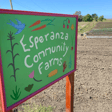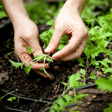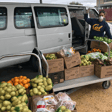
Spotlight on Equity - Esperanza Community Farms- Espanol version
These resources were produced in Spanish and English with intentionality to respect the community that is being highlighted at Esperanza community Farms, who speak primarily in Spanish.
It is with great pleasure that the Center for Best Practices Education and Training team would like to highlight Esperanza Community Farms (ECF).
ECF members are a unique group of farmers, students, and activists interested in changing the world. With intentions to end world hunger- they start by focusing on the land- on an organic farm; where the natural world is ever-present. ECF members learn from nature and share in the bountiful produce they receive from their labor. We invite you to read/hear about their Farm 2 Cafeteria Project where they have partnered with a local high school to bring organic produce to high school students.
They work at creating a healthy, localized food system based on food sovereignty. “Part of being equitable is allowing people to be individuals and to do things in ways that may not align with the status quo but are effective in creating long-term sustainable change.” Mireya Gomez-Contreras Co Leader (Co-Lider)


